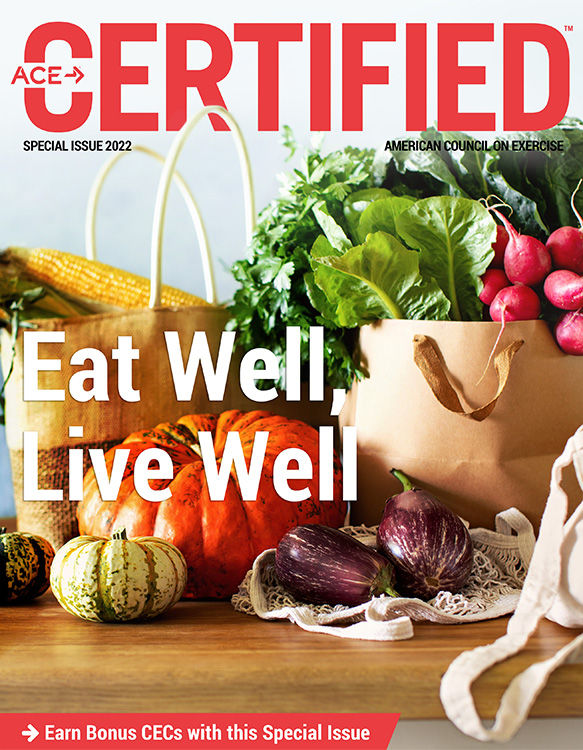
O.K., let’s get this out of the way: Nutrition-related scope of practice and standards of care is not the sexiest topic of discussion. I’ve been trying to think of exciting ways to kick off this article for the past couple of days and nothing has worked. That said, it’s an important topic for health coaches and exercise professionals to understand, as changes in the industry and in technology have greatly broadened the types of services you can offer to your clients and participants while staying within your defined scope of practice. Being able to offer these expanded services can enhance your practice, allow you to make more money and grow your business in the long run. And, of course, your clients benefit as well.
Nutrition can be an intimidating topic for a lot of health coaches and exercise professionals. The science can be complex and evolves so quickly that people sometimes don’t know what to believe. On top of that, the nutrition-related scope of practice can be confusing, and you may be unsure of the fine line between offering “nutrition advice” and “meal planning.” A lot of professionals simply opt to do nothing when it comes to nutrition and instead tell clients and participants that they can’t discuss the topic at all. If you make that choice, however, you may be undermining both their results and your business.
The first step to embracing nutrition as part of your practice is a change in mindset. “Don’t think of your scope of practice as a set of limitations,” says Chris Gagliardi, MS, Scientific Education Content Manager at ACE and an ACE Certified Personal Trainer, Health Coach, Group Fitness Instructor and Medical Exercise Specialist, “but rather as a set of opportunities.”
There is plenty of room within your scope of practice to play an important role in other aspects of clients’ and participants’ lives beyond your sessions or classes, explains Gagliardi. You should refer when necessary, but don’t make unnecessary referrals when you could instead empower your clients to make dietary changes on their own (with your support). This is something that Gagliardi says ACE Certified Professionals can “safely and confidently do within the scope of practice.”
Bringing the Scope of Practice to Life
The ACE Position Statement on Nutrition Scope of Practice for Exercise and Professionals and Health Coaches provides a list of topics that all ACE Certified Professionals should be prepared to discuss with their clients or class participants. Cassandra Padgett, senior health educator for a pediatric medical group in San Diego, Calif., a private nutrition coach for women and an ACE Certified Personal Trainer and Group Fitness Instructor, brings each of these topics to life with examples and suggestions you can offer your clients:
- Principles of healthy nutrition and food preparation: Aiming to include protein, vegetables and whole grains at each meal can provide nutrients and keep you satisfied (which can prevent cravings or energy crashes). Avoiding highly processed foods (like chips, fast food or packaged cookies) and sugar-sweetened beverages can also be beneficial for long-term health.
- Food to be included in a balanced daily diet: Imagine a bowl or plate divided into quarters and aim to include a fruit, vegetable, protein and grains, or at least three food groups per meal. This can help to provide a balanced and filling meal. Fruits, vegetables and whole grains provide fiber as well as vitamins and minerals.
- Essential nutrients needed by the body: Essential nutrients include protein, carbohydrates, fats, vitamins, minerals and water. Nutrient-dense carbohydrates include whole grains, legumes, fruits and vegetables. Healthy fats are found in foods such as avocado, nuts, fish or oils like olive oil. Eating a variety of fruits and vegetables (especially in a range of colors) can increase the variety of vitamins and minerals consumed.
- Actions of nutrients on the body: Protein is made up of amino acids, which are the building blocks for the body. Different protein foods are high in different amino acids, so it's important to vary the types of protein you eat. Examples of high-protein foods include chicken, fish, soybeans, lentils, ground beef and chickpeas. Protein is also satiating and can help to keep you full. Fats (specifically unsaturated fats) are important for brain and heart health and can help to reduce cholesterol. Carbohydrates are high in fiber, which is beneficial for digestion, and can also improve cholesterol.
- Effects of deficiencies or excesses of nutrients: Excess protein, fat or carbohydrate (basically, excess calories in the form of food or drink) are stored as fat in the body. Vitamins B and C are water soluble. If you have an excess, the body will excrete them with urination. Fat-soluble vitamins and minerals can be toxic if you consume too much. A protein deficiency can result in a loss of muscle mass and can cause hair, skin, and nail issues, as well as weight loss if deficient in calories. The body can’t store protein, but it can store carbohydrates; however, a carbohydrate deficiency may cause vitamin and mineral deficiencies, depending on nutritional intake. Fat deficiency can cause a deficiency in fat-soluble vitamins and can also impact skin and joint health.
- How nutrient requirements vary through the lifecycle: Infants and young children require more energy per kilogram of body weight than adults due to their rapid growth and development. Pregnant and lactating women also require additional calories, as well as vitamins and minerals. However, all age groups require a balance of protein, healthy fats and carbohydrates for optimum health and well-being.
- Information about nutrients contained in foods or supplements: Most supplements have no third-party testing and do not undergo clinical trials. Because supplement companies are insufficiently regulated in the United States (e.g., for evaluation of safety and efficacy, labeling and marketing claims, quality assurance and control, and poor reporting of adverse effects), most people should aim to get their nutrients from food and discuss supplementation with their health care provider.
Using Technology to Enhance Your Services
The scope of practice for ACE Certified Professionals isn’t changing, but technology and phone apps offer more options for providing support without stepping outside of that scope. According to Gagliardi, this gives you more of an opportunity to be involved in your clients’ or participants’ lives outside of your sessions or classes.
There are so many ways to use technology to enhance conversations about nutrition and bring this complex topic to life. Thousands of health- and nutrition-related apps are available, from calorie-counting apps that allow users to share their data with their health coach or exercise professional, to apps that allow them to share pictures of their meals before sitting down to eat. As Gagliardi points out, people tend to make better choices when they know their coach or trainer may be offering support in real time. These apps are essentially a technological update on traditional food diaries and food-frequency logs, but instead of being reviewed at each weekly session, they allow for in-the-moment behavior-change coaching and feedback.
“People have become a lot more open to doing things using technology now,” says Gagliardi, “and apps and things like Zoom are a great way to take advantage of that.” Zoom, FaceTime and similar tools can be used to record or livestream cooking demonstrations and educational sessions, or even to virtually join clients or participants as they do their grocery shopping, walking them through how to approach a store’s layout or compare food labels. Again, this is a way to use technology to expand your services while staying within scope of practice.
Using Nutrition to Round out Your Practice
Tying nutritional intake to physical activity, behavior change, stress management and other health-related topics of interest to a particular client or participant rounds out the full picture of health—and you simply can’t do that without discussing nutrition.
Dominique Adair, MS, RD, is an ACE Scientific Advisory Panel Member and a private practice fitness and nutrition adviser. She says that many clients focus almost exclusively on the exercise side of things—the “output” half of the weight-loss or wellness equation—and then are surprised when they don’t achieve their goals. So, providing services on the “input” or nutritional side is vital, not only for helping clients reach their goals but also in terms of getting to where you want to be as a professional. Never forget that having more successful clients equates to more success for you and your business.
Rather than getting caught up in a set of rules or terms you can and cannot say, Adair suggests that when you have a client or participant in front of you, ask yourself, “Am I the best person to help this individual?”
Starting with this high-level question will position you to provide the best standard of care.
If the answer is yes, ask yourself, “Am I familiar with the most current science available so that I can best help this person?” If yes, go ahead and provide advice and support while being mindful of scope of practice. If no (or not yet), tell the person that you will do some research so that you can discuss the topic more thoroughly during your next session.
If the answer to that big-picture question is no—perhaps because they were recently diagnosed with diabetes or are at risk for heart disease and the topic is therefore outside your range of expertise and scope of practice—then your responsibility is to build a network of clinicians and other professionals who you can refer out to so that you can support those clients.
The bottom line is, you never want to say, “I’d love to be able to help you, but I can’t.” You either want to be (or become) the expert or refer the person to the appropriate professional. That way, you maintain your credibility, stay within your scope and provide the optimal standard of care.
Answering Commonly Asked Questions
There are several commonly asked questions that all health coaches and exercise professionals should be prepared to answer. If your advice is relevant, within scope and evidence-based, you can feel comfortable and confident helping your clients or participants get a better understanding of nutrition and develop healthier eating patterns.
Nutrition lends itself to mythology and misinformation. “The area where I have seen the greatest opportunity, and I’m so grateful to the fitness professionals who are doing this, is in the area of myth-busting,” says Adair. When clients ask questions like, “Do eggs cause heart disease?” “Do I need to eat 200 grams of protein every day to build muscle?” or “Do I have to drink a gallon of water each day to stay hydrated?” you can offer science-based responses that further their understanding of nutrition.
At the end of the day, explains Adair, “anything that encourages healthy, plant-dominant and not overly restrictive eating” is going to be very helpful to most clients and participants.
Perhaps the most asked questions center on the use of supplements. When this topic arises, Adair suggests that ACE Certified Professionals always start by talking about real food. Encourage clients and participants to contemplate the definition of the word supplement: “Think about what the word means,” she says. “We supplement when something is deficient.”
So, the first step should be helping the individual develop an eating pattern of healthy foods that they enjoy. Then, if it is determined that the client is deficient in a particular nutrient, they can start thinking about whether they should supplement. Importantly, that is a conversation for a registered dietitian, not a health coach or exercise professional, as it is outside your scope of practice to diagnose or address nutrient deficiencies or recommend supplements.
That is a great example of when a referral is required. But, as a health coach or exercise professional, you can shift the conversation to one about sources of particular nutrients. For example, if a client or participant asks about protein shakes or supplements, you can discuss healthy sources of protein and provide strategies on how to distribute them throughout the day.
In Conclusion
This last scenario is an example of what Adair calls “helping with the how.” Perhaps the greatest role of a health coach or exercise professional is to empower clients and participants to develop and implement plans to do what they already know they should be doing. And this goes for all areas of wellness, not just nutrition and exercise.
Your role is to help clients and participants bridge the intention–action gap by providing them with education and tools that take them from what they’re doing now and what they want to do moving forward to actually making lifestyle changes.
“That doesn’t require a PhD in nutrition,” says Adair. “It requires a deep interest in, and understanding of, human behavior.” This, of course, is something with which any good health coach or exercise professional is already equipped.
Expand Your Knowledge
 |
This comprehensive nutrition course integrates the science of nutrition with the art of behavior-change coaching, which is the key to helping people make sustainable changes in their lives. Based not only on theory, but data from coaching over 100,000 real clients in hundreds of real-world situations, this course presents a practical system that shows you exactly what to do at every stage of the nutrition coaching process—from the very first time you meet with a client until they reach all their goals.
|
 |
As an exercise professional or health coach, it is important to remain within the scope of your practice when coaching nutrition and better nutrition choices to your clients. The Applying Nutrition Principles course bundle equips you with information and meaningful behavior-change techniques to help you support your clients in healthier food choices and implement into your practice immediately.
|
 |
Nutrition is a crucial part of an overall health and fitness plan, but the field of nutrition is broad and rapidly expanding, with new knowledge being published regularly. You play an important role in educating your clients and guiding them to make informed decisions about what to consume, while staying within your scope of practice. This course will help you build a foundation in nutrition and weight loss, including how diet impacts physical activity and performance, so you can advise clients on their nutritional choices and help them live healthier lives.
|





 by
by 





